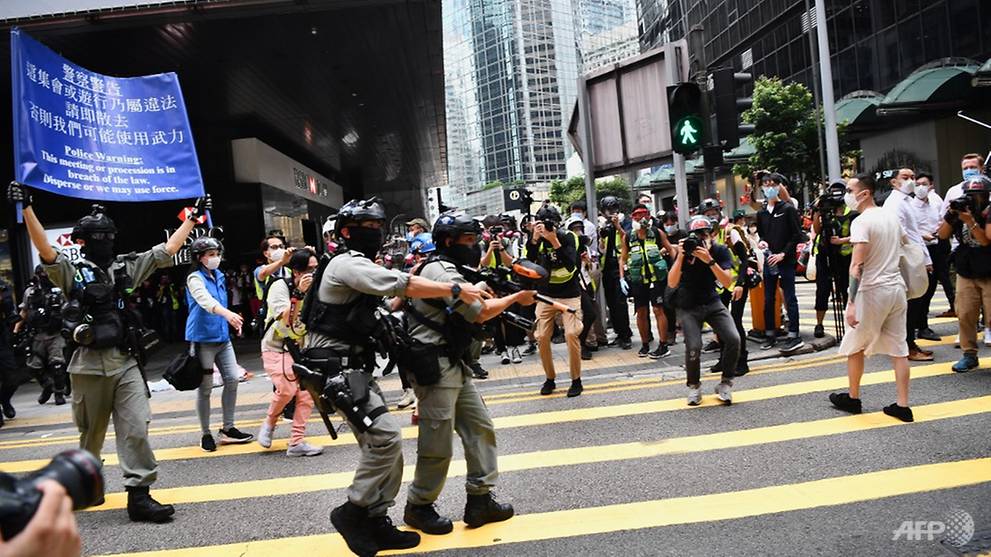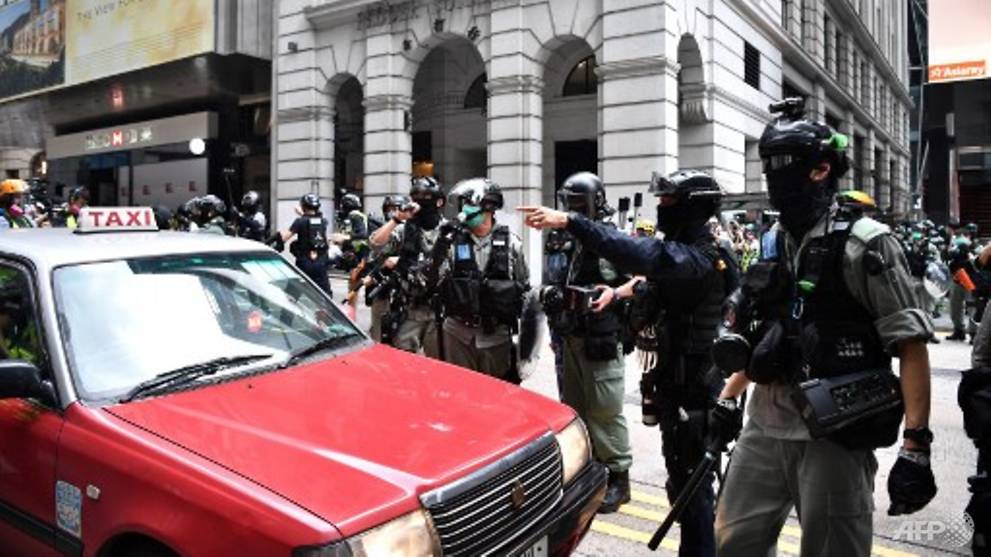
Hong Kong police fire pepper ball rounds at protesters, arrest 300 people
HONG KONG: Hong Kong riot police fired pepper pellets to disperse protesters in the heart of the global financial centre on Wednesday (May 27) and arrested 300 people as new national security laws proposed by Beijing revived anti-government demonstrations.
Police also surrounded the Legislative Council where a Bill was due to be debated that would criminalise disrespect of the Chinese anthem, amid soaring tensions over perceived threats to the semi-autonomous city's freedoms.
People of all ages took to the streets, some dressed in black, some wearing office clothes, and some hiding their identities with open umbrellas in scenes reminiscent of the unrest that shook the city last year.
"Although you’re afraid inside your heart, you need to speak out," said Chang, 29, a clerk and protester dressed in black with a helmet respirator and goggles in her backpack.
A call to gather around the Legislative Council was scrapped due to a heavy presence of riot police.
READ: Riot police surround Hong Kong legislature ahead of flashpoint anthem debate
Protesters gathered in the Causeway Bay and Central districts, leading to enforcement action, the Hong Kong police said in a statement on Facebook.
About 300 people were arrested, most for illegal assembly, in three districts, police said.
In an interview with Chinese state broadcaster CCTV, Hong Kong Security Secretary John Lee said police had adopted new tactics to control situations as soon as "something happens".
Traffic in the Central district was disrupted by protesters occupying roads, the police said.
Police earlier said they had arrested at least 16 people aged between 14 and 40, for alleged crimes including possession of offensive weapons, possession of tools for illegal use and dangerous driving.
Many shops, bank branches and office buildings closed early. Dozens of people were seen rounded up by riot police and made to sit on a sidewalk.
Protests have returned to the streets of Hong Kong after Beijing proposed national security laws aimed at tackling secession, subversion and terrorist activities. The planned laws could see Chinese intelligence agencies set up bases in the semi-autonomous city.
The move triggered the first big street unrest in Hong Kong in months on Sunday, with police firing tear gas and water cannon to disperse protesters.
READ: Explainer: Hong Kong's China national anthem Bill aims to legislate 'respect'
"LEGISLATION THAT DIRECTLY AFFECTS US"
Ahead of protests, authorities erected a two-metre wall made of plastic barriers filled with water around the Legislative Council, extending across a park up to Victoria Harbour.

In other parts of the city, protesters used bins and debris to block roads, while activists issued calls online for demonstrations in various locations later in the day.
Protesters in a downtown shopping mall chanted "Liberate Hong Kong! Revolution of our times" and "Hong Kong independence, the only way out", but dispersed as lookouts shouted a warning to "go shopping!" at the sight of police vans outside.
One protester was seen with a placard reading "one country, two systems is a lie", referring to the political system put in place at Britain's 1997 handover of the city to China that is meant to guarantee Hong Kong's freedoms until at least 2047.
"I’m scared ... if you don’t come out today, you’ll never be able to come out. This is legislation that directly affects us," said Ryan Tsang, a hotel manager.
As the protests in the financial district died down, hundreds of people gathered in the working-class Mong Kok district on the Kowloon peninsula, where protests flared repeatedly last year.
Marchers briefly blocked roads before being chased away by police.
Chinese authorities and the Beijing-backed government in Hong Kong say there is no threat to the city's high degree of autonomy and the new security laws will be tightly focused.
"It’s for the long-term stability of Hong Kong and China, it won’t affect the freedom of assembly and speech and it won’t affect the city's status as a financial centre," Hong Kong Chief Secretary Matthew Cheung told reporters. "It would provide a stable environment for businesses."

Hong Kong's most prominent tycoon, Li Ka-shing, said in a statement security laws were within every nation's right, but Hong Kong had the "mission-critical task" to maintain trust in "one country, two systems".
Hong Kong media reported Beijing had expanded the scope of the draft security legislation to include organisations as well as individuals.
The law was being revised to cover not just behaviour or acts that endanger national security, but also activities, broadcaster RTHK and the South China Morning Post reported.
READ: Trump sounds warning over Hong Kong's future
US President Donald Trump on Tuesday said the United States this week would announce a strong response to the planned security legislation for Hong Kong.
HONG KONG SHARES SLIDE
The US-China Business Council urged "all leaders to take those steps necessary to de-escalate tensions, promote economic recovery and the rule of law, and preserve the 'one country, two systems' principle".
Asian shares slipped over rising tensions between the United States and China. Hong Kong shares led declines with the Hang Seng falling 0.46 per cent, though it kept a bit of distance from a two-month low touched on Monday.

Protesters and pro-democracy politicians say Hong Kong’s National Anthem Bill, which aims to govern the use and playing of the Chinese national anthem, represents another sign of what they see as accelerating interference from Beijing.
The Bill carries penalties of up to three years jail and/or fines of up to HK$50,000 (US$6,450) for those who insult the anthem. It also orders that primary and secondary school students in Hong Kong be taught to sing the March of the Volunteers, along with its history and etiquette.
"As long as citizens don’t disrespect the anthem law, there’s no need to worry, I hope people can discuss the bill rationally," Chief Secretary Cheung said.
The anthem Bill is set for a second reading on Wednesday and is expected to become law next month.
MORE: Our coverage of the Hong Kong protests
Follow us on Telegram for the latest on Hong Kong: https://cna.asia/telegram